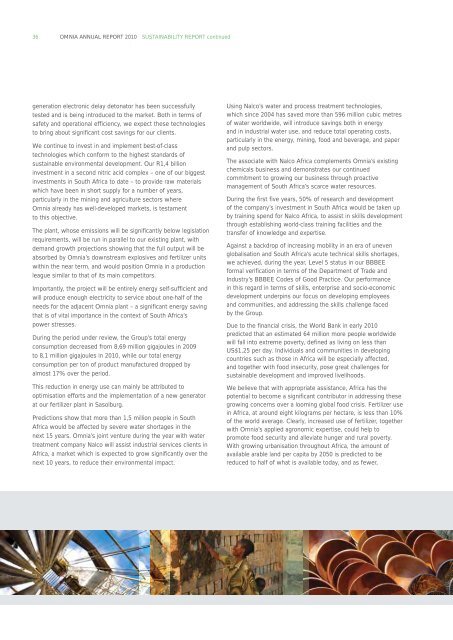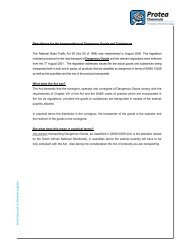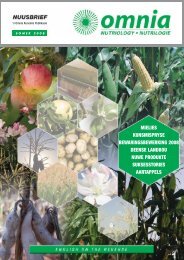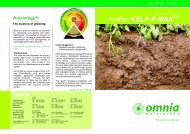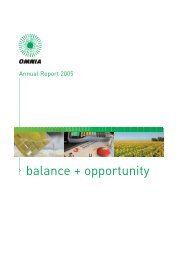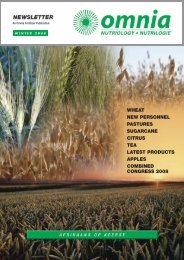omnia holdings annual report 2010 omnia holdings annu
omnia holdings annual report 2010 omnia holdings annu
omnia holdings annual report 2010 omnia holdings annu
Create successful ePaper yourself
Turn your PDF publications into a flip-book with our unique Google optimized e-Paper software.
36 OMNIA ANNUAL REPORT <strong>2010</strong> SUSTAINABILITY REPORT continued<br />
generation electronic delay detonator has been successfully<br />
tested and is being introduced to the market. Both in terms of<br />
safety and operational efficiency, we expect these technologies<br />
to bring about significant cost savings for our clients.<br />
We continue to invest in and implement best-of-class<br />
technologies which conform to the highest standards of<br />
sustainable environmental development. Our R1,4 billion<br />
investment in a second nitric acid complex – one of our biggest<br />
investments in South Africa to date – to provide raw materials<br />
which have been in short supply for a number of years,<br />
particularly in the mining and agriculture sectors where<br />
Omnia already has well-developed markets, is testament<br />
to this objective.<br />
The plant, whose emissions will be significantly below legislation<br />
requirements, will be run in parallel to our existing plant, with<br />
demand growth projections showing that the full output will be<br />
absorbed by Omnia’s downstream explosives and fertilizer units<br />
within the near term, and would position Omnia in a production<br />
league similar to that of its main competitors.<br />
Importantly, the project will be entirely energy self-sufficient and<br />
will produce enough electricity to service about one-half of the<br />
needs for the adjacent Omnia plant – a significant energy saving<br />
that is of vital importance in the context of South Africa’s<br />
power stresses.<br />
During the period under review, the Group’s total energy<br />
consumption decreased from 8,69 million gigajoules in 2009<br />
to 8,1 million gigajoules in <strong>2010</strong>, while our total energy<br />
consumption per ton of product manufactured dropped by<br />
almost 17% over the period.<br />
This reduction in energy use can mainly be attributed to<br />
optimisation efforts and the implementation of a new generator<br />
at our fertilizer plant in Sasolburg.<br />
Predictions show that more than 1,5 million people in South<br />
Africa would be affected by severe water shortages in the<br />
next 15 years. Omnia’s joint venture during the year with water<br />
treatment company Nalco will assist industrial services clients in<br />
Africa, a market which is expected to grow significantly over the<br />
next 10 years, to reduce their environmental impact.<br />
Using Nalco’s water and process treatment technologies,<br />
which since 2004 has saved more than 596 million cubic metres<br />
of water worldwide, will introduce savings both in energy<br />
and in industrial water use, and reduce total operating costs,<br />
particularly in the energy, mining, food and beverage, and paper<br />
and pulp sectors.<br />
The associate with Nalco Africa complements Omnia’s existing<br />
chemicals business and demonstrates our continued<br />
commitment to growing our business through proactive<br />
management of South Africa’s scarce water resources.<br />
During the first five years, 50% of research and development<br />
of the company’s investment in South Africa would be taken up<br />
by training spend for Nalco Africa, to assist in skills development<br />
through establishing world-class training facilities and the<br />
transfer of knowledge and expertise.<br />
Against a backdrop of increasing mobility in an era of uneven<br />
globalisation and South Africa’s acute technical skills shortages,<br />
we achieved, during the year, Level 5 status in our BBBEE<br />
formal verification in terms of the Department of Trade and<br />
Industry’s BBBEE Codes of Good Practice. Our performance<br />
in this regard in terms of skills, enterprise and socio-economic<br />
development underpins our focus on developing employees<br />
and communities, and addressing the skills challenge faced<br />
by the Group.<br />
Due to the financial crisis, the World Bank in early <strong>2010</strong><br />
predicted that an estimated 64 million more people worldwide<br />
will fall into extreme poverty, defined as living on less than<br />
US$1,25 per day. Individuals and communities in developing<br />
countries such as those in Africa will be especially affected,<br />
and together with food insecurity, pose great challenges for<br />
sustainable development and improved livelihoods.<br />
We believe that with appropriate assistance, Africa has the<br />
potential to become a significant contributor in addressing these<br />
growing concerns over a looming global food crisis. Fertilizer use<br />
in Africa, at around eight kilograms per hectare, is less than 10%<br />
of the world average. Clearly, increased use of fertilizer, together<br />
with Omnia’s applied agronomic expertise, could help to<br />
promote food security and alleviate hunger and rural poverty.<br />
With growing urbanisation throughout Africa, the amount of<br />
available arable land per capita by 2050 is predicted to be<br />
reduced to half of what is available today, and as fewer,


